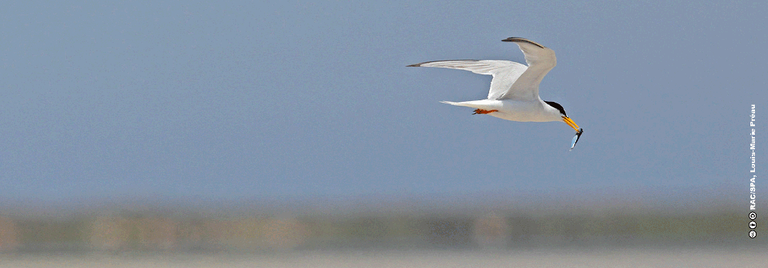THERE CAN BE NO HEALTHY MEDITERRANEAN WITHOUT A THRIVING WILDLIFE
World Wildlife Day (3 March) is an opportunity to beat the drum for the fauna and flora of the Mediterranean because they deserve all the attention that they can get. Unsustainable human activities and overexploitation of natural resources have taken a hefty toll on biodiversity in Mare Nostrum.
According to the 2018 State of World Fisheries and Aquaculture (SOFIA) report, published by the Food and Agriculture Organization of the United Nations (FAO), the Mediterranean Sea is the most overfished in the world: 62% of its fish stocks are overfished and at risk of being depleted. Inadequate fishing practices are also causing tragic biodiversity loss in other ways. Dolphins, turtles, seals and other endangered species perish when they are trapped in “ghost gear”—lost or discarded fishing equipment such as nets and longlines that may take up to 600 years to breakdown.
Ghost gear is one of the facets of the marine litter problem that threatens wildlife in the Mediterranean. With 210 million inhabitants living in coastal areas and 320 million tourists visiting each year, plastic pollution has reached alarming levels. It is estimated that up to 80 per cent of marine turtles are affected by litter in certain areas around the Mediterranean.
Marine vegetation has not been spared. Posidonia Oceanica Meadows – also known as the lungs of the Mediterranean, because it constitutes one of the most important sources of oxygen in coastal waters – is on the decline. A study conducted in 2015 (Telesca, L. et al.) revealed that the regression of meadows amounted to an estimated 34 per cent in the last 50 years due to “the cumulative effects of multiple local stressors”.
Under the auspices of UNEP/MAP, the Contracting Parties to the Barcelona Convention and its Protocol concerning Specially Protected Areas and Biological Diversity have adopted several Regional Action Plans to safeguard marine and coastal fauna and flora. Significant progress has been made in the development of a comprehensive regulatory framework safeguarding Mediterranean Biodiversity. The UNEP/MAP Regional Activity Centre for Specially Protected Areas (SPA/RAC) continues to enhance the collective body of knowledge and technical expertise available for action.
Regional Action Plans and Strategies based on the best available scientific and technical knowledge have been devised to protect endangered species and threatened habitats. The Strategic Action Programme for the Conservation of Biological Diversity in the Mediterranean Region (SAP BIO) constitutes the main instrument for regional cooperation to halt biodiversity loss in Mare Nostrum.
This endeavor has resulted in undeniable gains for Mediterranean wildlife but gaps in the enforcement of legal obligations undertaken by the Contracting Parties under the Barcelona Convention has stalled progress.
The 21st Meeting of the Contracting Parties to the Barcelona Convention and its Protocols (COP21, Naples, 2-5 December 2019) recently adopted a batch of decisions on biodiversity conservation. Four new sites were designated as “Specially Protected Areas of Mediterranean Importance (SPAMI)” in France, Italy, Slovenia and Spain. Based on the findings of a recent evaluation of the implementation of the Strategic Action Programme for the Conservation of Biological Diversity in the Mediterranean Region (SAP BIO), the Contracting Parties updated strategies and plans for the conservation of iconic Mediterranean species, including the Mediterranean monk seal.
The Mediterranean monk seal is one of the world’s most endangered marine mammals. Most people living in the Mediterranean today probably have never seen a monk seal in its natural habitat. “monk seal recovery in the Mediterranean is still possible,” according to Khalil Attia, the Director of SPA/RAC. “But for this to work, we will need determination and unfaltering commitment on the part of governments,” he added.
The extinction of this iconic mammal would hit conservation efforts hard. “We cannot afford to let the monk seal go. The symbolism of such an occurrence would go beyond the species group itself to cast a grim cloud over conservation efforts in the Mediterranean and beyond,” said Gaetano Leone, the UNEP/MAP—Barcelona Convention Secretariat Coordinator.
In the super year for nature and biodiversity, progress in the implementation of the updated strategies on monk seal, sharks and cartilaginous fishes under the Barcelona Convention will demonstrate the Contracting Parties’ commitment to the spirit of the Naples Ministerial Declaration in which they describe 2020 as a “critical turning point for the conservation and sustainable management of the Mediterranean Sea and coast” and underscore the “need for a systemic change supported by forward-looking and innovative strategies, policies, and behaviors”.
On World Wildlife Day, let the endearing image of the Mediterranean monk seal remind us of the need for bold action to protect Mediterranean biodiversity for our own sake, because there can be no healthy Mediterranean without a thriving wildlife.

